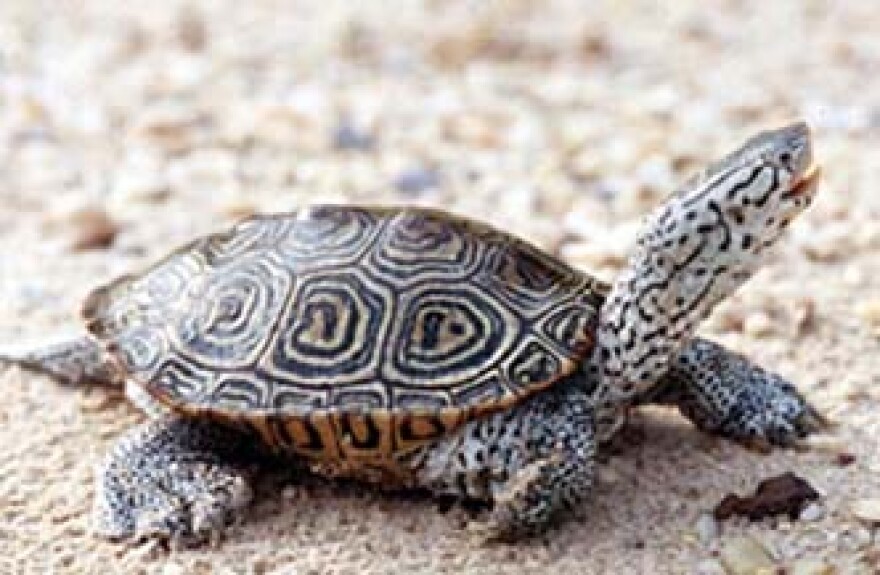Diamondback terrapin are a proud symbol of Maryland: a handsome turtle with a white neck spotted with black that is uniquely adapted to swimming in the mix of salty and fresh water in the Chesapeake Bay.
Almost a decade ago, news stories about the sale of thousands of captured ‘terps from an Eastern Shore turtle dealer to brokers to who sold them in China sparked outrage among Maryland legislators, who passed a 2007 law banning the commercial trapping -- and even possession -- of terrapin.
Jack Cover, general curator at the National Aquarium in Baltimore, was among those who feared for the turtle’s declining populations.
“Basically the bay’s ecosystems could not produce terrapin at a fast enough rate to satisfy that market demand,” Cover said. “And there was an insatiable demand coming from Asian markets in the years prior to the closing of the commercial fishery.”
But, oddly enough, nine years after the ban, the Eastern Shore turtle breeding and dealing business that triggered the state action is not only still in business, but has more than doubled in size, according to state records.
R. & R. Aqua Farms LLC of Preston, Maryland, now has 12 one-acre ponds full of turtles, as well as eighty 150 gallon tanks and six 1,200 gallon tanks in three buildings on a 100-acre turtle farm, state documents indicate.
The U.S. Fish and Wildlife service calls it the largest diamondback terrapin production facility in the United States. In 2014, the federal agency investigated the business because it exported 14,600 diamondback hatchlings that year to other dealers, who sold them overseas.
How could this happen, despite the law that was designed to protect Maryland’s state reptile? Well, as it turned out, at the last minute, state Delegate Marvin Holmes of Prince George’s County and other lawmakers sympathetic to the business owner slipped in an amendment into the 2007 terrapin protection law. This loophole created an exemption from the ban on the possession for turtle farms that breed their own terrapin. Then as now, there was only one turtle farm in Maryland.
A leading terrapin expert, biologist Willem Roosenburg of Ohio University, said that Maryland’s allowing of an ongoing turtle-selling business amid a ban on commercial possession can make it hard to tell which terrapins are being legitimately hatched on the farm and which could be secretly caught from the wild and then sold.
“I think clearly whenever you have a species that has a wild component and also a farmed component that you always run the risk of poaching,” Roosenburg said. “To the extent that that is happening? I have no idea.”
The owner of the business, Rodney W. Lewis of R. & R. Aqua Farms, declined to be interviewed for the radio. In a brief telephone call, he said that he had not purchased or captured any terrapin illegally. “Everything is legitimate, everything is fine. But there are too many people that – for a lack of a better word, call them treehuggers -- are trying to put me out of business,” Lewis said.
Karl Roscher, an assistant director at the Maryland Department of Natural Resources, said he has inspected Lewis’ turtle farm and has no reason to suspect he is breaking any laws. “Absolutely, he’s in good standing with the department,” Roscher said.
But New Jersey wildlife officials were upset and banned all terrapin trapping in their state last year because Lewis purchased 3,500 pregnant female terrapins that may have been caught illegally from the wild, according to Dave Jenkins, a bureau chief at the New Jersey Division of Fish and Wildlife.
“The guy from Maryland who bought them represented to the Fish and Wildlife service that they had been obtained legally because that was his understanding, because the person from New Jersey who sold them to him told him ‘Yes, I harvested them legally,” Jenkins said. “We’re fairly certain that is not the case.”
More likely, Jenkins said, the pregnant females were dredged up illegally from where the terrapin were hibernating on the bottom in large groups. Because terrapin are in decline, such a large capture from the wild was seen by state regulators as a real problem. New Jersey legislators followed up by outlawing terrapin trapping.
Despite all this, America’s biggest terrapin business keeps on selling. But R. & R. Aqua Farms biggest export – beyond turtles – appears to be an unintentional one: statewide bans on terrapin trapping, which have spread from Maryland to New Jersey and may soon protect terps up and down the East Coast.
…………………..
Photo of terrapin at top by Willem Roosenburg on Maryland.gov website




